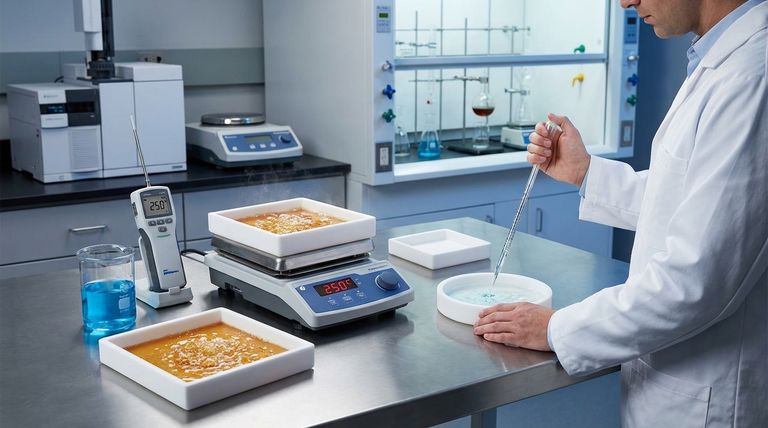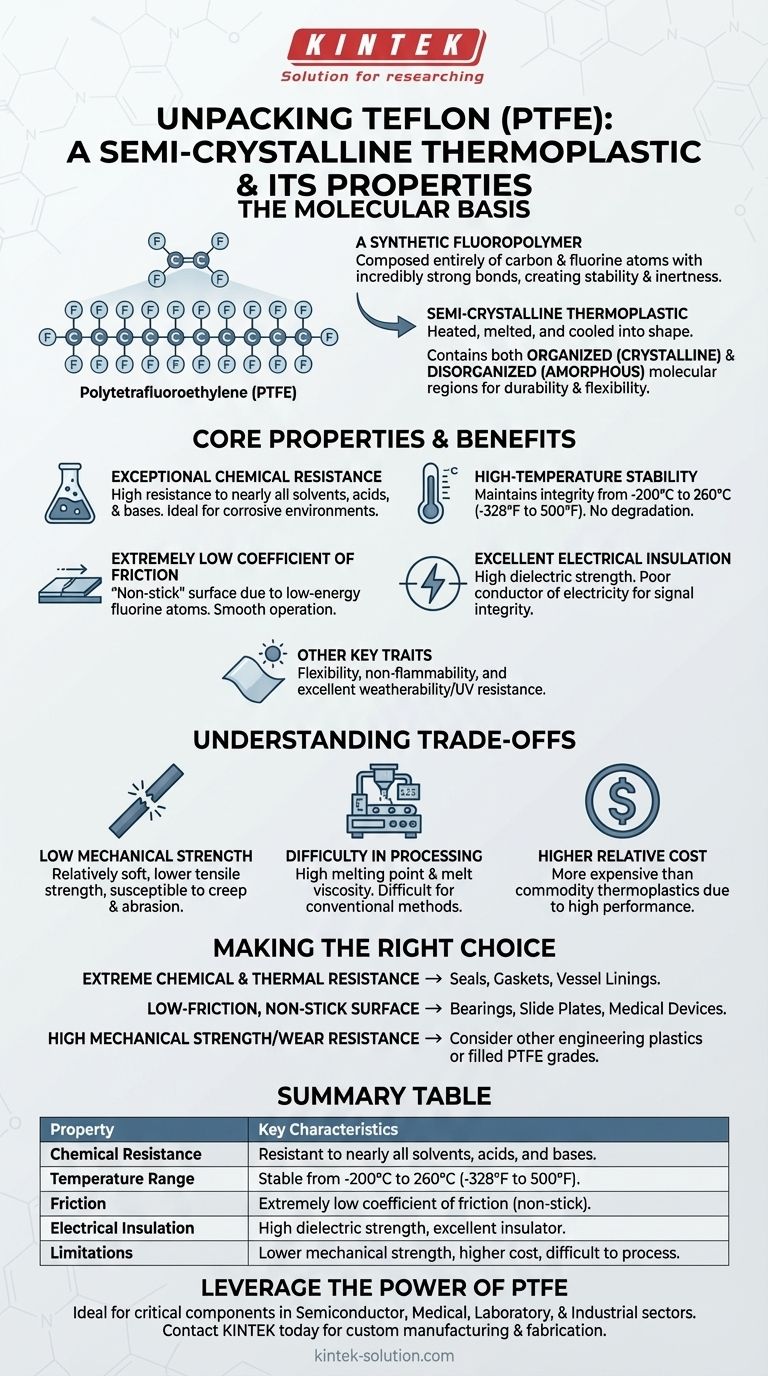At its core, Teflon is a semi-crystalline thermoplastic known as a fluoropolymer. Its chemical name is Polytetrafluoroethylene (PTFE), and it is renowned for an exceptional combination of properties, including extreme chemical resistance, high-temperature stability, and an incredibly low coefficient of friction, which creates its famous non-stick surface.
The power of Teflon (PTFE) comes from its simple but remarkably stable molecular structure. The strong bonds between its carbon and fluorine atoms create one of the most inert and reliable materials available for withstanding extreme chemical and thermal environments.

The Molecular Basis of Teflon's Properties
Teflon is a synthetic polymer, meaning it is a large molecule made of repeating smaller units. Its unique characteristics are a direct result of its specific chemical makeup.
A Synthetic Fluoropolymer
Teflon, or polytetrafluoroethylene (PTFE), is composed entirely of carbon and fluorine atoms. This creates incredibly strong carbon-fluorine bonds, which are responsible for the material's signature stability and inertness.
A Semi-Crystalline Thermoplastic
As a thermoplastic, PTFE can be heated to a melting point and then cooled into a new shape. Its semi-crystalline structure means it has both organized (crystalline) and disorganized (amorphous) molecular regions, contributing to its overall durability and flexibility.
Unpacking the Core Properties
The molecular structure of PTFE gives rise to a set of valuable inherent properties that make it a critical material in many demanding industries.
Exceptional Chemical Resistance
The powerful carbon-fluorine bonds are extremely difficult for other chemicals to break. This gives PTFE a high resistance to nearly all solvents, acids, and bases, making it ideal for use in corrosive environments.
High-Temperature Stability
PTFE maintains its integrity across a very broad working temperature range, typically from -200°C to 260°C (-328°F to 500°F). It does not degrade or lose its core properties within this wide window.
Extremely Low Coefficient of Friction
Often cited as one of the lowest of any solid material, this property is what makes Teflon "non-stick." The fluorine atoms create a very low-energy surface that prevents other materials from adhering to it, ensuring smooth operation in mechanical parts.
Excellent Electrical Insulation
PTFE has a very high dielectric strength, meaning it is a poor conductor of electricity. This makes it a superb insulator for high-performance wiring and electronic components where signal integrity is critical.
Other Key Traits
Beyond the primary properties, PTFE is also valued for its flexibility, non-flammability, and excellent weatherability, as it is highly resistant to degradation from UV light and outdoor exposure.
Understanding the Trade-offs
While PTFE is an exceptional material, its unique properties come with practical limitations that are critical to understand for proper application.
Low Mechanical Strength
Compared to other engineering plastics, PTFE is relatively soft. It has lower tensile strength and is more susceptible to creep (the tendency to slowly deform under a constant load) and abrasion.
Difficulty in Processing
The same thermal stability that makes PTFE so durable also gives it a very high melting point and melt viscosity. This can make it more difficult and expensive to process using conventional methods like injection molding.
Higher Relative Cost
As a high-performance fluoropolymer, PTFE is generally more expensive than commodity thermoplastics like polyethylene or polypropylene. Its use is typically justified by performance requirements that other materials cannot meet.
Making the Right Choice for Your Goal
Selecting a material requires matching its inherent properties to the primary challenge you need to solve.
- If your primary focus is extreme chemical and thermal resistance: PTFE is an unparalleled choice for seals, gaskets, and vessel linings in the chemical processing, aerospace, and energy sectors.
- If your primary focus is a low-friction, non-stick surface: It is the definitive material for high-performance bearings, slide plates, non-stick coatings, and medical devices where smooth operation is critical.
- If your primary focus is high mechanical strength or wear resistance: You may need to consider either a different engineering plastic or a filled grade of PTFE, where additives are used to enhance its structural properties.
Ultimately, understanding the fundamental link between PTFE's molecular structure and its properties allows you to leverage its strengths for the most demanding engineering challenges.
Summary Table:
| Property | Key Characteristics |
|---|---|
| Chemical Resistance | Resistant to nearly all solvents, acids, and bases. |
| Temperature Range | Stable from -200°C to 260°C (-328°F to 500°F). |
| Friction | Extremely low coefficient of friction (non-stick). |
| Electrical Insulation | High dielectric strength, excellent insulator. |
| Limitations | Lower mechanical strength, higher cost, difficult to process. |
Leverage the Power of PTFE for Your Most Demanding Applications
PTFE's unique combination of properties makes it the ideal material for critical components in the semiconductor, medical, laboratory, and industrial sectors. Whether you need custom seals, liners, or labware that can withstand extreme temperatures and corrosive chemicals, KINTEK has the expertise.
We specialize in the precision manufacturing and custom fabrication of PTFE components, from initial prototypes to high-volume production runs. Our process ensures your parts meet the exacting standards required for performance and reliability.
Ready to solve your toughest material challenges? Contact KINTEK today to discuss your specific requirements and get a quote for your project.
Visual Guide

Related Products
- Custom PTFE Parts Manufacturer for Teflon Containers and Components
- Custom PTFE Parts Manufacturer for Teflon Parts and PTFE Tweezers
- Custom PTFE Teflon Balls for Advanced Industrial Applications
- Custom PTFE Bottles for Diverse Industrial Applications
- Custom PTFE Square Trays for Industrial and Laboratory Use
People Also Ask
- What are the base characteristics of PTFE? Unlocking Extreme Performance in Friction, Temperature, and Chemical Resistance
- What are the unique properties of PTFE? Unlock Unmatched Performance in Demanding Applications
- What is PTFE commonly known as and what are its unique properties? Unlock Unmatched Chemical & Thermal Resistance
- What are the material advantages of machining Teflon? Unlock Unmatched Chemical & Thermal Resistance
- What is the working temperature range of PTFE? Master Extreme Heat and Cryogenic Applications



















